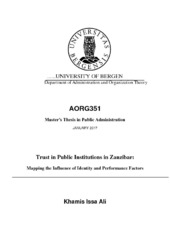Trust in Public Institutions in Zanzibar: Mapping the Influence of Identity and Performance Factors
Master thesis
Permanent lenke
https://hdl.handle.net/1956/15629Utgivelsesdato
2017-01-30Metadata
Vis full innførselSamlinger
- Department of Government [457]
Sammendrag
What explains trust in public institutions in Zanzibar? The study's main objective was to examine the significance of identity and perceptions of performance in explaining citizens' political trust in Zanzibar. Using a mixed method approach, the study utilised the strength of each method to interrogate, clarify, and compare findings to derive meaningful interpretations of the data. The Afrobarometer round 6 survey data from Tanzania, the main quantitative data source of the study, was supplemented by qualitative data from 8 focus group discussions with ordinary citizens, 10 in-depth interview with key informants, documentary review, and researcher's direct field observation to make powerful analysis. The study employed two dominant theories of trust, namely, the identity theory, and the institutional theory of trust in guiding the analysis and interpretation of findings. An interactive conceptual framework, which depicts multiple interaction effects between variables, was developed to engage identity and performance theories as complementary to each other in understanding trust in public institutions. The study findings reveal that perceptions of institutional performance, especially political performance and satisfaction with social service delivery, have the most strongest and pervasive effect on citizens' trust attitudes, while party affiliation and historical legacies among were also found to have powerful influences on citizens trust in their government. The three together- perceptions of performance, party affiliation, and historical legacy- have the most interactive and trust eroding effect on political trust in Zanzibar.
